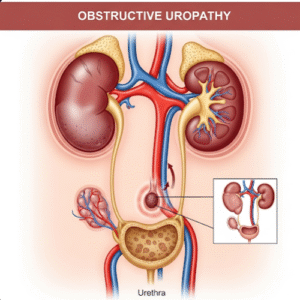Overview
Urosepsis is a life-threatening condition caused by a severe infection in the urinary tract that spreads into the bloodstream, leading to systemic inflammation and organ dysfunction. It is a medical emergency that requires prompt diagnosis and aggressive treatment. Urosepsis most often arises from untreated urinary tract infections, especially in high-risk populations such as the elderly, immunocompromised patients, or those with urinary obstructions.
What is Urosepsis
Urosepsis is a serious systemic infection originating from the urinary tract, usually from the bladder, ureters, or kidneys, that progresses into the bloodstream, causing sepsis. It represents a critical complication of urinary tract infections (UTIs), especially pyelonephritis (kidney infection). The condition can rapidly lead to septic shock, multi-organ failure, and death if not treated urgently with antibiotics and supportive care.
Symptoms
Urosepsis presents with both urinary and systemic symptoms, which may vary in severity:
- High fever and chills
- Rapid heartbeat (tachycardia)
- Rapid breathing (tachypnea)
- Confusion or altered mental status
- Decreased urine output
- Pain in the lower back, abdomen, or side (flank)
- Burning sensation or difficulty during urination
- Cloudy or foul-smelling urine
- Low blood pressure (a sign of septic shock)
Causes
Urosepsis is caused by bacteria entering the bloodstream from the urinary tract, most commonly:
- Escherichia coli (E. coli) – the most common cause
- Klebsiella, Proteus, Enterococcus, and Pseudomonas species
- Untreated or severe UTIs
- Obstructed urinary flow (e.g., kidney stones, prostate enlargement, urethral strictures)
- Urinary catheter-related infections
- Complicated pyelonephritis
Risk Factors
- Advanced age, especially in those over 65
- Chronic urinary tract infections
- Urinary retention or obstruction
- Indwelling urinary catheters
- Kidney stones or structural abnormalities
- Diabetes mellitus
- Immunosuppression (e.g., from cancer, transplant, or steroids)
- Recent urologic procedures or surgery
- Neurogenic bladder
Complications
Urosepsis can progress rapidly and lead to severe complications, including:
- Septic shock (life-threatening drop in blood pressure)
- Multi-organ failure (kidneys, liver, lungs, heart)
- Disseminated intravascular coagulation (DIC)
- Acute respiratory distress syndrome (ARDS)
- Permanent kidney damage
- Death, especially if treatment is delayed
Prevention
- Prompt treatment of urinary tract infections
- Regular monitoring of urinary catheters, with proper hygiene
- Good hydration to flush the urinary tract
- Avoidance of unnecessary catheter use
- Regular urination, especially after sexual activity
- Management of chronic conditions like diabetes or prostate enlargement
- Routine medical follow-up for individuals with known urinary problems
Treatment Options in Korea
South Korea offers advanced emergency care, diagnostics, and intensive management for patients with urosepsis. Treatment is typically multidisciplinary, involving urologists, infectious disease specialists, and critical care teams.
- Diagnosis:
- Blood cultures to identify the causative bacteria
- Urinalysis and urine culture
- Blood tests to assess organ function and inflammatory markers
- Imaging (ultrasound or CT scan) to identify the source of infection or obstruction
- Treatment:
- Immediate intravenous antibiotics, tailored based on culture results
- Intravenous fluids and vasopressors for blood pressure support
- Oxygen therapy or mechanical ventilation in severe cases
- Renal replacement therapy (dialysis) if kidneys are affected
- Surgical or interventional drainage of abscesses or obstructed kidneys
- Catheter or stent placement to relieve urinary obstruction
South Korea’s hospitals are equipped with state-of-the-art ICUs and rapid diagnostic systems, ensuring timely and life-saving treatment for patients suffering from urosepsis.












